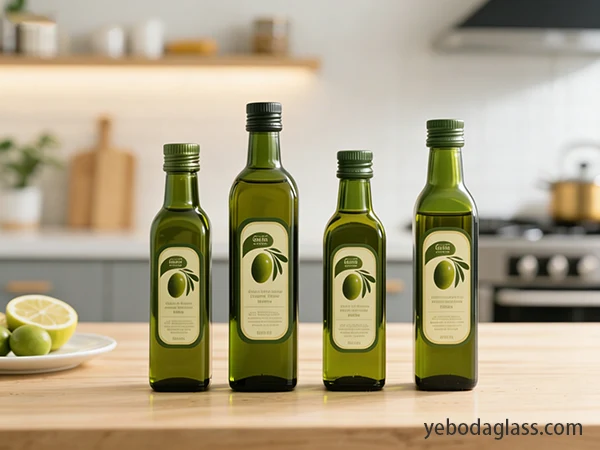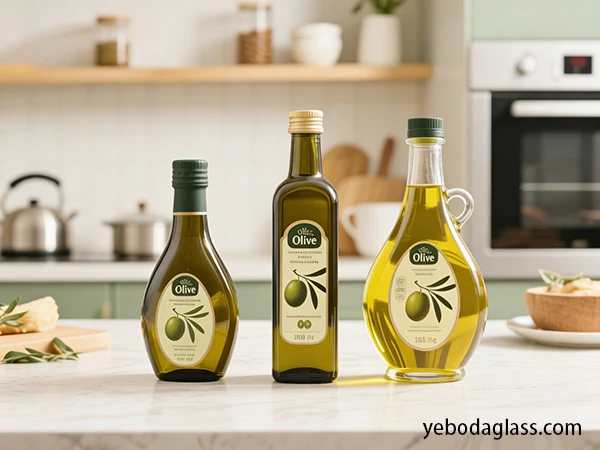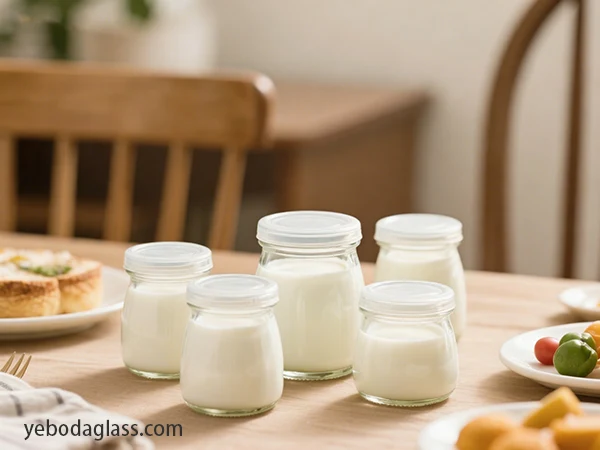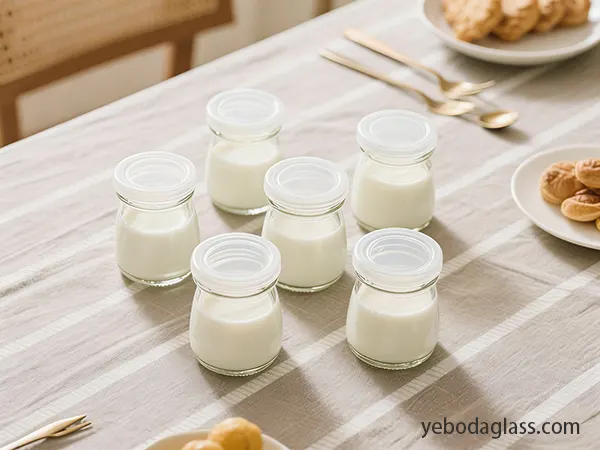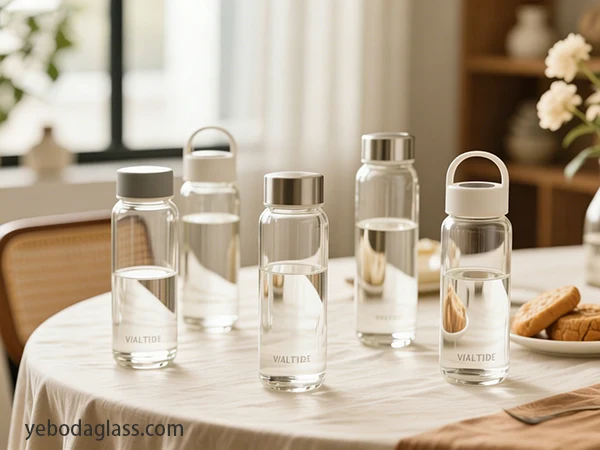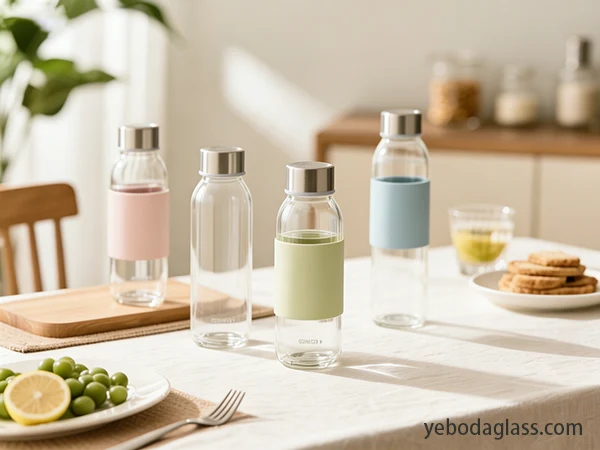Introducción
La estrategia de ventas a granel de botellas flip-top es fundamental para el sector de cosméticos, cuidado personal, alimentos y bebidas, productos farmacéuticos y productos químicos para la disfunción industrial. Permite ajustar la calidad, la rentabilidad y la personalización específica para armonizar con la identidad de marca y la funcionalidad de producción. El empaquetado influye significativamente en la visión del cliente, la integridad del producto y el éxito en el mercado. Una buena planificación de ventas a granel de botellas flip-top garantiza la calidad del material, la estabilidad del suministro y la consistencia en la escalabilidad del producto. La capacidad de proteger a proveedores de confianza a gran escala reduce la inestabilidad operativa y aumenta la competitividad de costos. Para las empresas que buscan empaques premium, Yeboda Proporciona soluciones confiables que combinan habilidades técnicas con producción responsable con el medio ambiente a gran escala. Botellas con tapa abatible a granel Pedidos. Esta guía explora las complicaciones de la adquisición de botellas flip-top de gran volumen, la definición de cobertura, la gestión de proveedores y la optimización de la cadena de suministro. Ofrece información práctica para tomar decisiones profesionales, reducir riesgos y lograr una ventaja competitiva mediante el mejor empaque. Se hace hincapié en la supervisión del contenido, la producción, la precisión del producto, el cumplimiento normativo y la gestión logística.

Definición de requisitos básicos para botellas con tapa abatible
Entorno de aplicación y uso
El primer paso para la compra a granel de botellas con tapa abatible es definir el uso previsto del producto y el entorno operativo. Esto determina el material, el sistema de cierre y el diseño ideales.
- Cosméticos y Cuidado Personal: Para transportar champú, acondicionador y loción, se debe utilizar un recipiente duro fabricado con materiales resistentes al aceite, a los rayos UV y a los olores.
- Comidas y bebidas: Lo primero que debemos considerar es cómo las botellas pueden ser los envases más adecuados para alimentos y bebidas. Esto significa que deben ser de calidad alimentaria para evitar reacciones con los productos y mantenerlos frescos. Además, la relevancia y la higiene también son factores importantes.
- Productos farmacéuticos: Los componentes de alta pureza y las características de manipulación son el uso de factores que garantizan la seguridad del consumidor y el cumplimiento normativo.
- Disfunciones industriales y productos químicos domésticos: Los contenedores tienen que pasar por pruebas y deben ser resistentes a situaciones donde pueden ocurrir solventes fuertes y altos niveles de estrés, y al mismo tiempo, tienen que mantener la integridad de la presa.
Yeboda botellas de vidrio Son conocidos por su inercia ideal, durabilidad y apariencia premium y, como resultado, son una opción ideal para alimentos gourmet y cosméticos de lujo que requieren pureza total y belleza visual.
Selección de materiales y rendimiento
- La determinación del material adecuado indicará la longevidad, el precio y la reciclabilidad del producto:
- MASCOTA: Ligero, transparente, resistente a los impactos y excelente para bebidas y cuidado personal.
- HDPE: Tiene una excelente resistencia a los productos químicos y es el embalaje más adecuado para detergentes y productos industriales.
- PÁGINAS: Puede soportar altas temperaturas y, por lo tanto, es la elección adecuada para cierres y diseños rellenables.
- Botellas de vidrio: Si bien tienen grandes desventajas, como ser pesados y costosos, aún ofrecen la mejor estabilidad química, sensación de lujo y reciclabilidad.
- Ingredientes de PCR: Están en línea con el paso hacia la sostenibilidad y ayudan a reducir la huella ambiental del producto.
La última decisión que se tome debe reflejar las necesidades funcionales, el propósito de la marca y la política de sostenibilidad.
Estándares de capacidad y finalización
El tamaño promedio (50 ml-1 litro) debería depender de la categoría del producto. Los acabados de cuello estandarizados (20/410, 24/410, 28/410) facilitan considerablemente la integración en la cadena de suministro y la compatibilidad final. Si bien los acabados de cuello personalizados son más específicos de la marca, también implican un aumento en el uso de herramientas y el plazo de entrega.
Aseguramiento de la calidad y cumplimiento normativo
Certificados de calidad requeridos
La producción de botellas con tapa abatible de alta calidad debe cumplir con estándares de fabricación y seguridad muy estrictos:
- ISO 9001: La calificación para garantizar una calidad estable del producto.
- BPF (Buenas Prácticas de Fabricación): Obligatorio para cosméticos y productos farmacéuticos.
- Cumplimiento de la normativa de contacto con alimentos de la FDA y la UE: Necesario para botellas en contacto con alimentos.
- Alcance y Proposición 65: Proporcionan protección a los usuarios al reducir las posibilidades de exposición a sustancias químicas nocivas.
Pruebas y verificación del rendimiento
El procedimiento de prueba que se lleva a cabo para garantizar el correcto funcionamiento del producto incluye:
- Se realizan pruebas para detectar fugas y caídas para garantizar que el producto pueda soportar el transporte.
- Entre las pruebas se encuentran la prueba de fugas para el cierre y la prueba de fatiga de la bisagra para el funcionamiento de la tapa abatible.
- La seguridad en el uso a largo plazo está garantizada mediante pruebas de compatibilidad química y migración.
- Se verifican la dimensión y la apariencia para garantizar que la calidad del lote sea la misma.
Cumplimiento normativo y ambiental
La cuestión del cumplimiento en este caso se extiende más allá de las preocupaciones de seguridad del producto a las cuestiones de sostenibilidad:
- Asegúrese de que las afirmaciones relativas a la reciclabilidad y la certificación de sostenibilidad sean verdaderas.
- Compruebe si las áreas del dispositivo a prueba de manipulaciones o a prueba de niños cumplen con los requisitos necesarios.
- Busque las marcas reglamentarias en las superficies de los productos que están etiquetados.
- Es un sistema de control de calidad estricto que es el más capaz de reducir las posibilidades de riesgo, garantizar la confianza en la marca y, por lo tanto, la lealtad del consumidor a largo plazo.
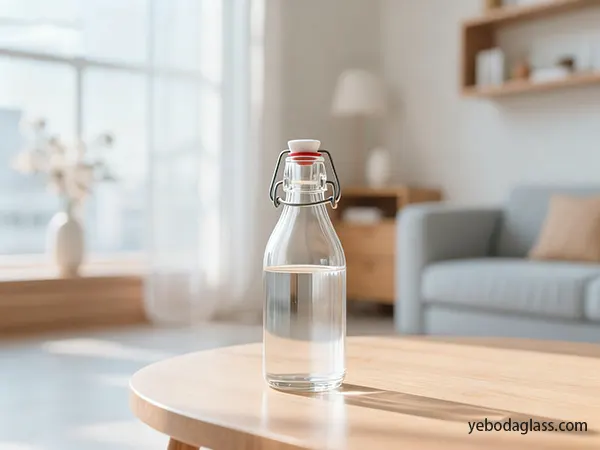
Estrategias de optimización de costos para pedidos al por mayor de botellas con tapa abatible
Modelo de precios al por mayor y cantidades mínimas de pedido de botellas con tapa abatible
Comprender los modelos de precios de los proveedores ayuda a reducir los costos de adquisición:
- Precios escalonados: Obtendrás un descuento por pedir un mayor volumen de productos.
- Sobre la negociación de la cantidad mínima de pedido: Encontrar el equilibrio adecuado entre una producción eficiente y un almacenamiento rentable.
- Costos de herramientas: Los moldes personalizados requieren un pago por adelantado; asegúrese de las condiciones de propiedad y mantenimiento.
Economías de escala e ingeniería de valor
Comprar al por mayor permite aprovechar el volumen para reducir el costo unitario y aumentar el poder de negociación. La ingeniería de valor es un método para descubrir oportunidades de ahorro mediante:
- Reducción o reemplazo de materiales (por ejemplo, HDPE más liviano para algunos SKU).
- Geometría simplificada de la botella.
- Diseño estandarizado del cierre.
Negociación y costo total de propiedad
Los aspectos a tener en cuenta al hablar con proveedores mayoristas de botellas con tapa abatible son:
- Las ventajas de un contrato a largo plazo (por ejemplo, estabilidad, servicio prioritario).
- Condiciones de pago que se traducen en un mejor flujo de caja.
- Incoterms que especifican las obligaciones de transporte y seguro de mercancías.
- Métricas de relación con proveedores: confiabilidad, innovación y tasas de defectos.
- Lo importante no es centrarse únicamente en el precio unitario sino más bien en optimizar el coste total de propiedad (TCO).
Opciones de personalización y estrategia de marca
Formas y cierres de botellas personalizados
Un moldeado personalizado o una marca en relieve pueden aumentar la singularidad de la marca y la comodidad de uso. Las marcas de lujo suelen optar por diseños únicos de tapas abatibles, lo que refuerza la usabilidad y la identidad visual.
Color, textura y tratamientos de superficies
- Combinación de colores: Se puede utilizar el teñido con resina para garantizar la consistencia de la marca.
- Acabados esmerilados o mate: Son capaces de encarnar el atractivo del lujo táctil.
- Metalización y recubrimientos: Son una herramienta eficaz para embellecer los envases de cuidado personal y de licores en el segmento de alta gama.
Integración de impresión y etiquetas
- Serigrafía: Es un tipo de branding directo en el que los materiales utilizados son duraderos.
- Estampado en caliente: Una de las características de los acabados premium es que puedes utilizar acentos metálicos.
- Etiquetas de manga retráctil: Gráficos de 360° y embalaje a prueba de manipulaciones.
- Etiquetado en molde (IML): Está diseñado para la producción a gran escala de botellas con tapa abatible, donde una etiqueta está integrada permanentemente en la pared de la botella.
Mejoras en la funcionalidad de cierre
Algunas de las mejoras del producto son:
- Mecanismos a prueba de niños o de manipulación.
- Sistemas de medición o dispensación integrados para productos farmacéuticos o químicos.
- También se pueden modificar los orificios correspondientes a la viscosidad del producto.
Una personalización eficaz combina la marca con la excelencia funcional, lo que hace que su cartera de productos destaque en un mercado competitivo.
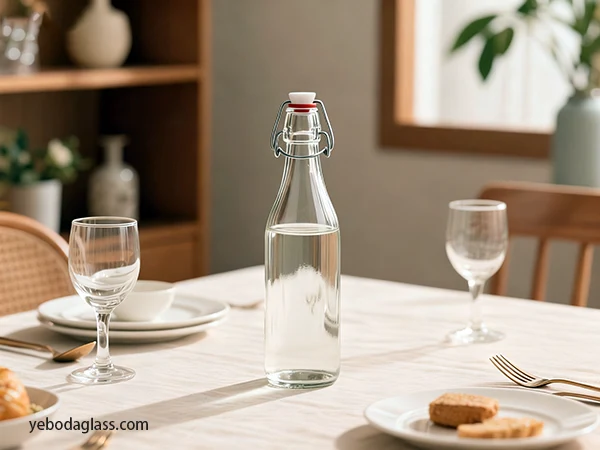
Verificación de proveedores y especificaciones
Evaluación de fabricantes potenciales
Evaluar a los candidatos en base a:
- Capacidad de estabilidad financiera y compromisos a largo plazo.
- Tecnología de productos (moldeo automático, impresión, línea de montaje).
- Sistemas de gestión de calidad certificados por ISO/GMP.
- Capacidades de I+D para la innovación y la colaboración en diseño.
- Responsabilidad ambiental y social verificada por ITS Ditts (por ejemplo, Smeta).
Realización de la debida diligencia
Realice inspecciones in situ, verifique los materiales y realice muestras de producción. A través de las referencias de los clientes, verifique la capacidad de respuesta, la comunicación y la buena trayectoria del proveedor.
Construcción de asociaciones
Los vínculos duraderos con los proveedores implican reducir los costos y obtener una parte de la innovación.
- Cree indicadores clave de rendimiento (KPI) para la tasa de defectos, la entrega a tiempo y la capacidad de respuesta.
- Las oportunidades de mejora se discuten en las revisiones comerciales trimestrales.
- Al mismo tiempo, mantenga un plan de respaldo utilizando un doble suministro como medida de seguridad para contingencias.
La colaboración con proveedores al máximo potencial los convierte de simples proveedores a sus socios estratégicos, brindándole una ventaja competitiva que perdura en el tiempo.
Optimización de logística, embalaje y cadena de suministro
Envío y distribución
- Transporte marítimo: Un método de envío de grandes cantidades a nivel internacional a bajo costo (se recomienda FCL).
- Transporte aéreo: Se utiliza sólo si el envío es urgente o ligero.
- Carretera/Ferrocarril: ¿Son adecuados los medios de transporte para entregas nacionales o regionales?
La optimización de rutas y la logística multimodal no sólo pueden reducir el tiempo del viaje sino también la huella de carbono.
Protección de embalaje
Un embalaje correcto es una forma de evitar daños durante el transporte:
- Apilado paletizado con utilización de film estirable.
- Las botellas de vidrio frágiles se protegen bien con el uso de divisores y tabiques.
- Si la ruta de envío es muy larga, entonces el refuerzo de esquinas y los desecantes son la solución para usted.
- Para las botellas de vidrio, los cartones de doble pared o las bandejas moldeadas minimizan las roturas.
Inventario y almacenamiento
Los modelos Just-In-Time (JIT) deben utilizarse para minimizar el inventario, pero también debe existir un stock de seguridad para cubrir las fluctuaciones de la demanda. Además, se recomienda el uso de Sistemas de Gestión de Almacenes (SGA) digitales para obtener visibilidad en tiempo real. Los modelos de inventario en consignación solo pueden permitirse con proveedores confiables a largo plazo para reducir la carga financiera.
Gestión de riesgos de la cadena de suministro
Implemente lo siguiente para volverse resiliente:
- Estrategias de doble abastecimiento.
- Rutas de envío diversificadas.
- Trabajar con proveedores de logística de terceros (3PL) experimentados puede facilitar los trámites aduaneros y el transporte, además de ahorrar tiempo y dinero.
- La logística optimizada y las prácticas de almacenamiento sólidas reducen los costos, mejoran la confiabilidad de la entrega y garantizan que la disponibilidad del embalaje se alinee con los cronogramas de producción.
Conclusión y recomendaciones estratégicas
Trabajar de forma interdisciplinaria con expertos en materiales, cumplimiento normativo, gestión de costos y logística es fundamental para adquirir botellas flip-top a granel de forma estratégicamente sólida. Gracias a especificaciones precisas, sostenibilidad y alianzas con proveedores de confianza, las empresas podrán alcanzar la excelencia operativa y consolidar su posición en el mercado.
Recomendaciones estratégicas clave
- Definir especificaciones con precisión: Asegúrese de atender el material de la botella, el volumen, el diseño y el acabado sin dejar lugar a dudas.
- Calcular el costo total de propiedad: Piense en el flete, las herramientas, la calidad y el almacenamiento, además del precio de la unidad.
- Haga uso de la sostenibilidad: Opte por materiales PCR o aligerados para estar a la altura de los objetivos de sostenibilidad regulatorios y de los consumidores.
- Fomentar el compromiso de los proveedores: Al tener alianzas que duren en el tiempo, uno puede tener estabilidad, mejores precios y lo más importante, innovación.
- Puertas de garantía de calidad de construcción: Desde el momento en que se introducen las materias primas, pasando por cada etapa de producción hasta el envío, se deben implementar estrictas medidas de control de calidad.
- Fortalecer la resiliencia de la cadena de suministro: En lugar de depender de una sola fuente, busque opciones alternativas y consiga los almacenamientos de seguridad necesarios para satisfacer la demanda.
- Utilice la tecnología: Comience a utilizar el análisis de gestión de la cadena de suministro (SCM) para comprender el significado de las tendencias del mercado emergente y monitorear la productividad de los proveedores.
- Asegúrese de cumplir con las regulaciones: Mantener el cumplimiento mediante auditorías periódicas según los estándares en constante cambio como FDA, UE y REACH.
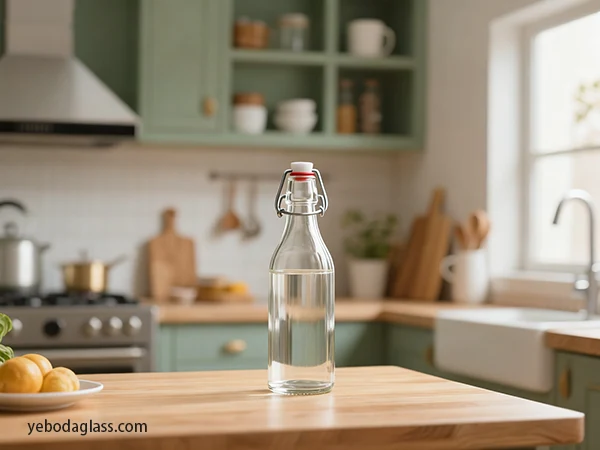
Visión final
Si las empresas emplean un método estructurado y basado en datos, podrán convertir la compra a granel de botellas flip-top en su ventaja competitiva sostenible. Así, podrán proporcionar envases de alta calidad, rentables y alineados con la marca, que contribuyan tanto a la rentabilidad como a la responsabilidad ambiental.

